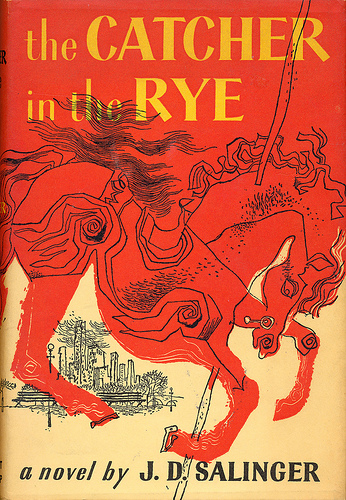The Catcher in the Rye by J. D. Salinger
![]()
![]()
![]()
![]()
![]()

I never read anything at the right time. This not only applies to seasonal reads, but generational reads. During a recent A. V. Club binge, I came across a Q & A post where contributors talked about what they would make required reading to graduate from high school. Among them was The Catcher in the Rye, which I have managed to completely miss. (That’s not too surprising; I’ve managed to completely miss The Wizard of Oz. Now I’m just holding onto that out of sheer stubbornness.) I have a hard time relating to teenage protagonists, but, for some reason, I found myself wandering the fiction shelves at the library and automatically taking it home. It’s not the usual time, perhaps, but it’s the right time for me.
The Catcher in the Rye follows seventeen-year-old Holden Caulfield over the course of two days in December of 1949. Having just been expelled from his posh private school, Holden decides to head home to New York earlier than anticipated—he figures he’ll spend the difference at a hotel and then go home to his disappointed parents. Over the course of the two days, Holden suffers several misadventures, from a failed night with a prostitute to a date with an ex-girlfriend to a mugging, as he ponders the meaning of life in his own peculiar way.
I went into The Catcher in the Rye expecting to hate Holden Caulfield. And that’s held—I don’t like him as a person. But I don’t like him because I have been him. I don’t like to talk particularly seriously about my childhood and adolescence; it’s a lot easier and socially accepted to poke fun at my younger self’s taste for eating glue and paper and smug ignorance than discuss the anger that motivated her and her tremendous capacity to hate, especially when I rarely, if ever, see teenagers like that in the media I consume. (Teenage protagonists tend to be people you like.) But in Holden, I see her so clearly—even as I recoil, I recognize the familiar. Holden has that immense cruelty, as he spews sarcasm at everything in his life except his younger sister Phoebe and his dead brother Allie, so young and yet so bitter at a world that’s so “phony”.
And that cruelty and bitterness comes out of fear, just as mine did. Holden, facing expulsion and the impending adult world, is terrified of it. He has no idea what he wants to do with his life; his older brother, the writer D. B., used to be an inspiration, but D. B.’s move to Hollywood to be a screenwriter does not meet Holden’s exacting standards for real and intelligent behavior. (It helps that we know Holden fails them, too—late in the novel, he has drinks with an intellectual friend of his, desiring intellectual conversation, but only bugs him for details of his sex life.) He grows most animated and sincere in the novel in two places—when he asks Sally, the ex-girlfriend, to run away with him, and when he reflects on childhood visits to the Museum of Natural History. The former is Holden’s only real vision of a life beyond high school, a life without any higher ambition than just living, and the latter is the clearest proof that Holden yearns to be a child again. Even as he contemplates how the dioramas inside stay the same no matter how much you’ve changed, the only changes he thinks of are the concerns of small children. For all his cynicism, sarcasm, and cruelty, Holden ultimately believes in the innocence of children—he’s utterly shocked and defeated at discovering profane graffiti at his little sister’s elementary school. This, though, is where Holden and I, even the monster that was, part ways; I think innocence is just a romanticized version of ignorance.
I read this in a few hours; I picked it up, assuming I’d make a start, and ended up just tearing through it. The Catcher in the Rye is sixty-one years old, but Holden’s voice is so sharp, crisp, and fresh that it’s sometimes a little shocking to come across the details that date it. Insofar as a plot, there’s not much action, but that’s not why you read The Catcher in the Rye; you read it to better understand adolescence. Donna Bowman of the A. V. Club recommends it to people graduating from high school to “a mirror for the present, and a key to what lies beyond”, but I would have been paralyzed by such knowledge and clarity of thought. It’s only now, after having cleared the hurdle of becoming a person, that I can read this and, looking back, understand.
Bottom line: The Catcher in the Rye perfectly captures the contradiction of being a teenager. How trite that sounds, but how true. Read it.
I rented this book from the public library.
You’ve made this book sound fascinating, thank you. I have tried to read this a couple of times, but I find myself getting so frustrated with the adolescent whinging I have never been able to finish it. I will keep trying to finish it thought, because I do think it captures a reality of teenagehood that I will find interesting to read, as long as I can convince myself to get past all the complaining Holden does
I think what stops a lot of people is that they assume the author agrees with the adolescent whinging, which isn’t true at all.
Pingback: The Sunday Salon: Bookish Questions « The Literary Omnivore
Pingback: The Sunday Salon: 2012 in Review « The Literary Omnivore